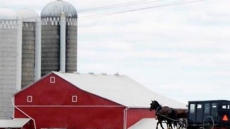WEST LINCOLN, Ont. — Some 17,000 hens and one rooster at Roger Pelissero's egg farm in West Lincoln, Ont., live in cages that may be the envy of most other hens in Canada.
The cages, which are about 1.5 metres wide and 3.7 metres long, contain about 60 hens per colony and are outfitted with perches, a scratch pad and two partitioned nesting areas for laying eggs in private.
But as major restaurant chains increasingly promise to dish out eggs solely from hens not confined to cages, they shun enriched caging — a compromise that Pelissero and other Canadian egg farmers hope that hens, farmers and consumers can live with.
"No one housing system is perfect," said Pelissero. "They all have positives and negatives."
Pelissero's hens once lived in battery cages, a type of housing that only offers each bird the living space of about a standard piece of paper. In 2013, he upgraded to enriched cages, which allow hens to exhibit more natural behaviours, like dust bathing.
About 90 per cent of hens in Canada currently live in battery cages, according to the Egg Farmers of Canada, an organization representing more than 1,000 of the country's egg farms. The remainder are in enriched cages, indoor free-run systems or free range, with the ability to go outside.
Pelissero considered shifting to a cage-free alternative but decided against it due to health concerns for his birds and workers, mostly family.
Cage-free housing can mean more dust and ammonia in the barn because hens aren't completely separated from their litter, said Peter Clarke, chairman of the Egg Farmers of Canada.
Dust is "a major concern" for farmers, Pelissero said. "I have my son working in the barn. My wife working in the barn."
When a person excessively inhales dust, it can lead to diseases like so-called bird fancier's lung, according to the Canadian Centre for Occupational Health and Safety.
People working in free-run set-ups can suffer short-term respiratory problems, found a 2015 study by the Coalition for Sustainable Egg Supply.

Both enriched and free-run systems can expose people to high ammonia levels, but not enough to significantly impact health, according to the study.
Hens are not immune to the health effects of these workplace hazards either, said Clarke.
Despite high dust and ammonia levels, the study found, hens monitored in free-run systems showed no signs of eye, nasal opening or breathing problems.
Still, birds in free-run systems died more frequently, pecked at other hens more aggressively and their keel bones showed more damage than their battery cage counterparts. The hens living in free-run systems were also more likely to die of cannibalism.
Pelissero also had to take operating costs into account. His new cages cost a bit more to operate than the previous battery cages. However, food and labour costs in free-run barns are even higher, according to the study.
For these reasons, the Egg Farmers of Canada suggests consumers shouldn't be so quick to want to scrap these larger cages as farmers intend to include these in their future plans.
The organization is moving toward eliminating battery cages over the next 20 years, giving farmers the option to shift to enriched housing or a cage-free alternative.
Clarke already knows he'll retrofit his barns from battery to enriched cages.
That means neither Clarke nor Pelissero will be able to supply eggs to some of the big fast-food chains, like McDonald's and Tim Hortons, that have promised to eliminate all caged hen eggs from their supply chains in the future.
Animal rights' groups continue to lobby for more restaurants, like A&W, to make this shift. They don't buy into enriched housing as a better caging alternative, saying the housing still poses cruel conditions to animals.
Pelissero said he believes companies are making decisions based on peer pressure from animal welfare activists.
Still, he's not concerned about running out of customers, as Canadian consumers are egg farmers' No. 1 clients and the grocery stores they shop at still offer a range of choice, including certified organic eggs (which are always free-range) and those from enriched housing.
But if public opinion joins the changing corporate tide, Canada's egg farmers may have to reconsider their stance.
Clarke would consider transitioning to cage-free housing if demand outstripped supply, but that decision would come with concerns for the welfare of his hens and himself.
"I know there's going to be some challenges (in those systems)."





